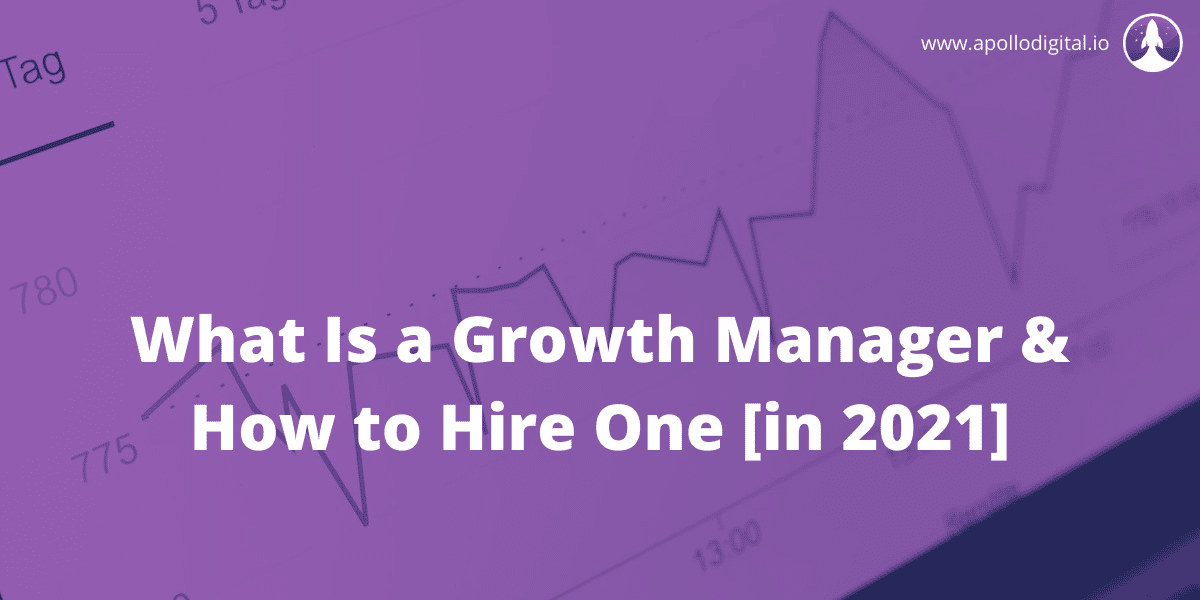For most companies, growth in revenue and profits is a core objective. In fact, it’s even typically implied that every employee has a form of responsibility for it.
In recent years, though, organizations have begun employing a new position—the growth manager, who is solely focused on identifying growth opportunities.
Said differently, the growth manager is the employee who keeps a business competitive and leading, based on market changes and consumer needs.
If you’ve never heard of this role, are unsure whether you should consider it for your company, or simply want to know where you can find the best growth managers - you’ve come to the right place.
This guide will explain in detail what a growth manager is, whether your business needs to hire one and how to find the best and brightest alternatives.
Read along to learn about:
- What Is a Growth Manager?
- 5 Main Responsibilities of a Growth Manager
- 9+ Essential Skills of a Growth Manager
- Do YOU Need a Growth Manager?
- How to Hire a Great Growth Manager
What Is a Growth Manager?
In the broadest sense, a growth manager is responsible for improving a business’ success.
Clearly, this implies different things for different companies. Success can mean gaining new customers, targeting new audiences, reviving inactive consumers, boosting the top-line product, expanding marketing efforts, and so forth.
The overall goal is to make moves that increase profit and decrease expenses.
Now, these benefits cannot be achieved by relying on a gut feeling or a streak of luck. The growth manager needs to depend on factual data from the competition, departments within the company, target market, and user patterns.
So, rather than hope things miraculously work out on their own, growth managers make progress by working with different departments and analyzing market data and results. They use the data collected to develop and implement a growth plan.
So, in essence, growth managers set achievable company growth goals and then work towards making them happen.
Want to learn how to use clever marketing strategies to boost your business’ growth? Then, head over to our Growth Marketing Guide for 2021.
5 Main Responsibilities of a Growth Manager
Although the job description varies from business to business, the key responsibilities of a growth manager include:
- Monitoring and responding to market changes. Growth managers should always be aware of any outside developments and market conditions that can affect their company. Mainly, these include interest and exchange rates, new technologies and innovations, and the competition’s behavior.
- Gathering user insight. Growth managers need to have a deep understanding of user needs, preferences, and opinions. This feedback can be gathered from business intelligence tools, surveys, targeted interviews, and customer feedback.
- Define your KPIs. Which metrics should you track in order to get a good idea of how your marketing is performing? Whether that’s revenue, total units sold, subscriptions, new contracts, follower count - it’s for the growth manager to decide.
- Create a growth plan. Next, the growth manager needs to figure out what actions to take to influence growth and reach the growth objectives. It’s important they define the exact impact of the plan, how much it’ll cost, and where that revenue will come from.
- Implementing the growth plan. This responsibility requires collaboration with a growth team and the specific departments that need to implement changes. So, if the growth plan involves the development of a new product, the growth manager would need to work with the production and marketing team.
9+ Essential Skills of a Growth Manager
You can probably already draw some essential growth manager skills from the job description and responsibilities, like knowing how to use data and design tools, collaborating and leading teams, communicating ideas effectively, etc.
But considering their complex and multifaceted job position, there’s more to being a growth manager than having good management skills.
Here’s a list of the main characteristics that make a successful growth manager:
- Fluent in data analytics and data processing tools, such as MySQL, Excel, R, etc.
- Master in statistical understanding and the ability to understand customer behavior data accurately.
- Knowledgeable in consumer behavior and how to walk a consumer through their buyer’s journey.
- Fluent in customer acquisition channels, e.g: organic search, direct traffic, email marketing, digital marketing, referrals, paid search, and so on.
- Good general knowledge about the service/product: technical aspects, marketing channels, how it’s sold, costs of production, pricing, and more.
- Effective communication skills. Growth managers need to communicate efficiently to both internal and external stakeholders. Internally, they have to present a compelling message that justifies the requested investment and risk. Externally, they need to convince customers that their product/service is worth buying.
- Experienced in leadership and capable of managing cross-functional teams to reach a shared objective. For those seeking expert guidance in navigating these challenges, consulting with a seasoned business mentor can provide the insight and direction needed to achieve sustained growth.
- Problem-solving and strategic-thinking skills that allow them to quickly identify and fix any concerns that occur in carrying out a growth management plan.
Do YOU Need a Growth Manager?
As much as you want your company to grow, it doesn’t necessarily mean that you need a growth manager. Even the best growth manager in the world won’t be of help unless you’ve got two key components figured out: product development and data infrastructure.
Let’s elaborate on what they exactly mean.
Product Development Before Growth
Before you start investing in growth, you must first provide a good or service that your target audience loves. Otherwise, hiring a growth manager won’t earn your business any benefits, as there won’t be any customers to acquire in the first place.
Now, we know what you may be thinking: isn’t customer acquisition one of the responsibilities of a growth manager?
Technically, yes. However, commercial products go through five hierarchical stages: product development, introduction, growth, maturity, and decline. A growth manager should be hired during the maturity stage.
The reason for this is, no matter how good your growth manager is at marketing, they won’t be able to drive results if your product simply doesn’t work.
As such, we recommend you to avoid hiring a growth manager until you’ve managed to reach product-market fit.
Looking for inspiration for your growth marketing campaigns? Check out these 31+ growth hacking examples that got amazing results.
How to Hire a Great Growth Manager
If you’ve made it here, you’re probably convinced and ready to hire a growth manager - but don’t really know how to start.
The struggle is real: finding a person with the right set of skills and professional experience can be a challenge. The good news is we’ve got a few actions you can take to put you in the right direction.
First, you need to figure out the characteristics, experience, and knowledge you’re looking for in a growth manager.
Usually, the best growth managers possess the following:
- Curiosity and experimental mindset. Acquiring new customers isn’t easy. You need to find someone willing to test, learn, explore, and come up with creative ideas.
- Both quantitative and empathy skills. A good growth manager needs to be both analytical and able to understand the customer. They have to measure results and prioritize high-impact experiments while brainstorming marketing tactics and upholding consumer standards.
- Communicative and understanding. Being a growth manager means working across multiple functions. They must talk to the design team for creative, finance for budgeting, production to ensure a good customer experience, and so forth, depending on the growth plan. If a growth manager doesn’t possess the communication skills to interact seamlessly with these functions, they’re not the right fit.
- Broad knowledge and experience in marketing. A growth manager should be an expert at foundational marketing tools such as Google Analytics and Excel, BI, and social media. And as far as marketing goes, they should also be able to know numerous marketing tactics necessary to acquire new customers.
In addition to sourcing candidates with these skills, it’s important to craft a competitive salary and employee benefits package that you can offer them. Attracting top talent is not only dependent on the responsibilities and growth opportunities they will be offered but also on the remuneration package that will reflect the value these professionals bring to your company.
The interview process is a good chance to determine the right fit. There are tons of questions you can as to a candidate to validate their qualifications, work experience, skillset, and professionalism, such as:
- What are some indicators that a company has achieved a P/MF?
- How would you leverage social media in order to reach our target audience?
- What marketing channels are you strongest in?
- Which SEO tools do you prefer/favor?
- What kind of growth have you driven for other businesses?
- Tell me about a time you’ve worked well under pressure?
Their answers will help you see if they have the skills you’re looking for.
Another way to test a candidate during the interview is by diving into specifics and learning more about case studies of their past experiences.
Either directly ask them, or pick an accomplishment from their resume and ask the following questions:
- What was the project about?
- What tactics did you propose to implement growth? Which ones worked?
- How did you measure success?
- Would you think the channels you used for this strategy would also be relevant for our company?
- Which other departments did you collaborate with?
From their past results, you'll be able to tell whether the person is legit or not.
Key Takeaways
And that’s a wrap!
For a quick recap, here are some of the main points we’ve covered:
- Hiring a growth manager means having a growth-dedicated employee that works towards increasing your profits and expanding your customer base.
- Whether your company’s in the right place to hire a head of growth depends on your level of product development and data infrastructure.
- If you’ve achieved product-market fit and can provide a growth manager with the necessary resources for data analysis, then it’s time to jump into the search.
- During the hiring process, start with the end goal in mind. What characteristics and experience do you want your growth manager to have? Usually, it’s best to look for someone with broad marketing experience, a curious and creative personality, and good leadership skills.


